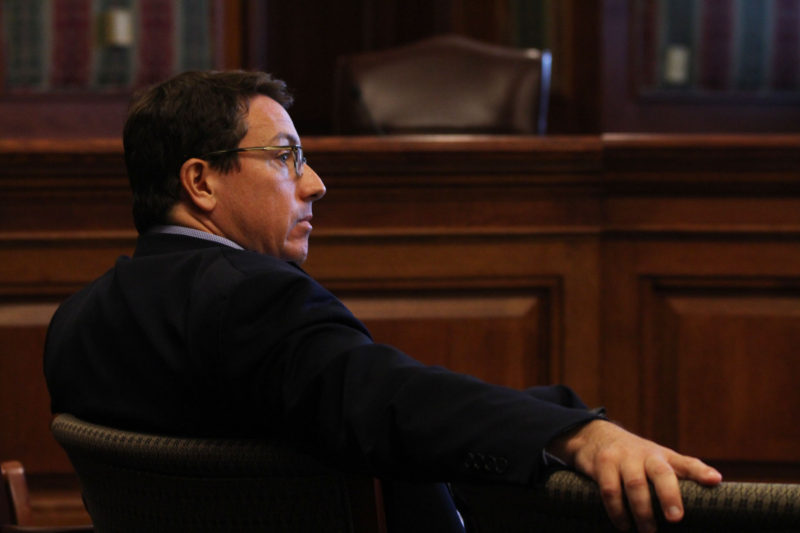JEFFERSON CITY, Mo. – Michael Barrett, the director of the State Public Defender’s Office, met with members of the Joint Committee on the Justice System Tuesday on the eve of veto session to continue making his case for increased funds.
This summer, Barrett made national headlines for an open letter he sent to Gov. Jay Nixon, in which he assigned a case to the governor to highlight the department’s funding woes.
“Given the extraordinary circumstances that compel me to entertain any and all avenues for relief, it strikes me that I should begin with the one attorney in the state who not only created this problem, but is in a unique position to address it,” Barrett wrote.
Barrett spoke as plainly and bluntly as he did in the letter. He noted that the public defender’s office had serious funding deficiencies and that the office needed more money to effectively do its job.
“The state has made it impossible for me to do my job,” he said. “We simply need to be funded.”
Among the litany of problems Barrett said his office faced because of a lack of funds, perhaps the most impactful was Barrett’s explanation for Nixon’s rebuttal to the funding increases the office has received in recent years. While Nixon argues the increase in funding to the public defender’s office amounts to a 15 percent increase under his administration, Barrett argued that after accounting for statewide employee raises and other types of revenue, the amount of funding for legal services only amounts to a 5.5 percent increase.
“Since 2009… our litigation costs have gone up 18 percent,” he said. “Our only saving grace is that cases were down a couple of years, but they’re back up again.”
Barrett says that means public defenders cannot properly represent their clients, especially when it comes to bringing in expert testimony which can cost hundreds of dollars an hour. That lack of funding means the wrong people could go to prison, or without due diligence, the wrong people could get out of prison.
RubinBrown, an accounting and business consulting firm, performed an audit of the office at Barrett’s behest. It recommended that the office hire 332 additional attorneys for 2016 to assure all of the office’s clients had “competent coverage.”
That figure would mean almost doubling the current number of attorneys in the public defender’s office.
Also, there are currently no funds to establish a private defender’s office in Springfield, meaning that the Columbia public defender’s office covers an area regarding 86 counties between Kansas City and St. Louis.
“I don’t think taxpayers want to pay lawyers to drive around the state when they could be in their office working on cases,” Barrett said.
Sen. Bob Dixon, R-Springfield, brought up another problem regarding the transfer and holding of prisoners and the state not needing to .
“How your office would receive a legislative proposal that would specifically say if a sheriff moves inmates for financial purposes in order to rent space, then they also have to share in funding the defense of that inmate that has been moved four or five towns away?” he asked Barrett.
Barrett said funding the office could rectify that problem at its source by ensuring lawyers got to those cases quicker, but he conceded that he would not mind having any alleviation to his funding problems.
“I think that any methods you can get more funding to address our funding would be great,” he said.









